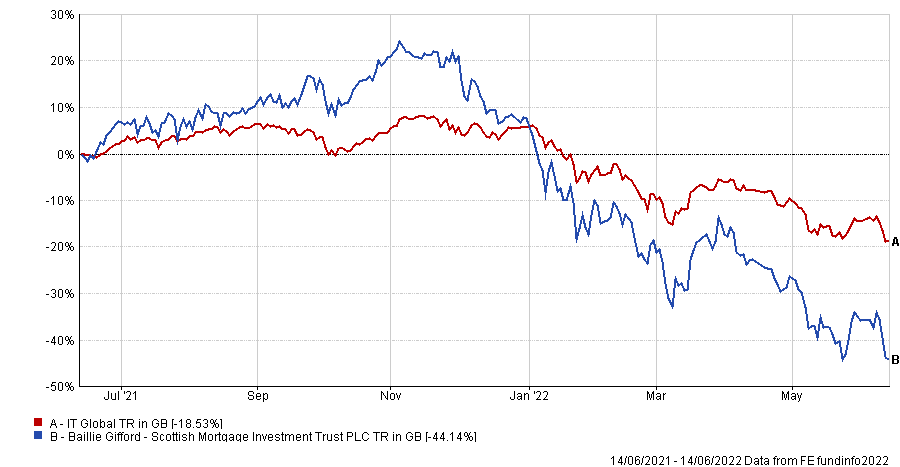Investec has released a ‘hold’ judgement for Scottish Mortgage, but downgraded it from its previously held ‘buy’ score, suggesting investors should stick with the trust but be wary of allocating more to the portfolio.
Since the beginning of the year, discomfort has increasingly taken hold of this UK flagship trust, which last month lost its title of UK’s largest investment trust following a 49.4% erosion of its value from its £20bn peak of November 2021. It is now down 55% since its peak and is 9 percentage points away from its 2008 slump of 64%.
The trust is being battered both by a poor performance of its high-growth tech holdings and investors, who are choosing to back out.
Performance of trust vs sector over 1yr

Source: FE Analytics
So far, analysts all round have entertained hopes it would make a comeback on the basis of its excellent long-term track record and its differentiation, as it holds shares in the digitisation, information technology, biology and energy transition sectors.
Tracy Zhao, senior fund analyst at interactive investor, said the trust “remains a strong choice” for the long term, especially at the current trading discount.
Numis believes “Scottish Mortgage continues to warrant a significant place in a portfolio given its unique approach and history of bouncing back from periods of weakness.”
Jefferies are standing by their ‘buy’ rating too.
But Investec analysts Alan Brierley and Ben Newell disagree. “While we continue to regard Scottish Mortgage as a core holding, this is not the time to be catching falling knives, and we move to Hold,” the said.
In this more challenging macroeconomic environment for long duration assets, Scottish Mortgage is enduring a “perfect storm”, they said.
“At the start of the year, we said that we expected a more challenging macroeconomic environment for long duration assets, and this storm appears some way from passing.”
They added that with calls of peak inflation proving to be wrong (much in the way transitory inflation was last year), central banks will need to continue to hike rates, as the Federal Reserve did last night.
While this would hit the trust’s listed growth holdings, the pair also highlighted the private equity portion of the trust, which stood at 34% of net asset value (NAV) at 30 April although may be more now.
“In our research on The Schiehallion Fund, we have highlighted a valuation lag and the significant disconnect that exists between the valuation of private holdings, and the experience of public companies with high growth characteristics,” the analysts said.
“While there will be exceptions, we expect these private valuations to come under increasing pressure.”
This suggests investors should not expect a ‘V-shaped’ recovery in the near future, but as a ‘core’ holding they should continue to back the trust over the long term.





